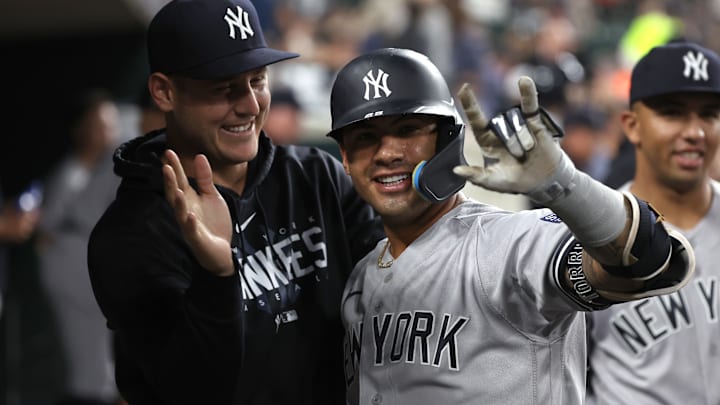Do the 2024 New York Yankees intend to compete for an AL East banner? For a title? Or do they intend to recede, with an underwhelming class of free agents (and bad fits) ahead of them?
If the Yankees need a year of evaluation time to figure out which "kids" belong and how Brian Cashman's strategy can possibly be reconfigured around their currently long-term budget issues, then a resurgent Gleyber Torres must be traded this offseason. If the Yankees believe they can fix this quickly, and that DJ LeMahieu's bounce back is for real/Anthony Rizzo can recuperate by Opening Day, then Torres should earn second base starts over Oswald Peraza next season.
The one thing the Yankees can't afford to do, though? Extend Torres prematurely while they pick a lane.
Peraza will get a good deal of playing time -- most of it at third base -- down the stretch in 2023, and in the month remaining, he has to show some ability to hit big-league fastballs (.040 average against 116 fastballs this season) and begin to get the ball off the ground (56 percent ground ball rate in 2022/23 in MLB). Handing the keys to Peraza for 2024, without significant September changes, would feel like an admission of retreat. If the Yankees do intend to trade Torres, while weakening the '24 lineup, they'd better aim for pitching help (or an offensive sure thing, as unlikely as that would be) for 2025 and beyond.
But whatever they do, they had better not deem Torres the best they're going to do at second base moving forward, rewarding another right-handed hitter with a six- or seven-year pact, especially with so many middle infielders in the system beneath him.
Gleyber Torres collected 2 RBI and 2 XBH including his 21st homer of the year in a clean 4-1 win over the Tigers. pic.twitter.com/NhztrauBeT
— YES Network (@YESNetwork) August 29, 2023
Yankees can trade or hold Gleyber Torres, but they can't extend him
Forget the mental lapses and defensive gaffes for a minute, as difficult as that may be. Those who've extolled Torres' offensive value in recent years are as right as they've ever been; his .780 OPS through Monday's action is finally in line with his .784 career mark, which has been propped up significantly by the juiced ball 2019 season. His 113 OPS+ also fits nicely with his 114 career mark.
He's a good hitter who may never be great. He should not be a contending team's best player. But you can't refute the fact that, at a still-mostly-powerless position, Torres is emerging as an above-average option for this season and next. The only regular second basemen who out-OPS him are Luis Arraez (.842), Ketel Marte (.838), Ozzie Albies (.831), Marcus Semien (.809), Ha-Seong Kim (.804) and Nolan Gorman (.799). His second half, with less protection in the lineup, has been even better (.302 with an .868 OPS).
Far too good to discard, far too unpredictable to reward with security. Torres' emergence has potentially left him an even bigger conundrum than when he was scuffling, filling fans with anger as he failed to build on his promise.
A team with high expectations trading a player like Torres, whose ability to control the strike zone is improving (91st percentile K%) while his exit velocity stays middling (58th percentile hard-hit), would be a bizarre pivot point. Torres would need to have displayed Alex Verdugo-like lapses for any GM to be praised for "selling high" as his peripheral numbers improved. That said, the Yankees have enough minor-league depth at all levels (and all infield positions) for Brian Cashman to at least consider that difficult decision, knowing it might be several years before the team finds someone who can approximate his production (and also knowing the 2024 roster might be pre-backed into a .500 corner, at best). But making the "difficult decision" go away by chasing it with a blank check? That would be really foolish.
Sadly, no matter what the Yankees choose, Pablo López isn't walking through that door.
